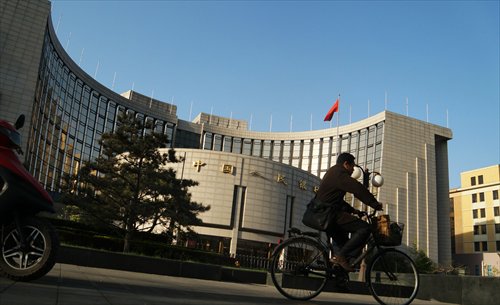SDR extension may prompt more opening
Progress on capital account could boost yuan’s profile

A cyclist rides past the headquarters of the People's Bank of China, China's central bank, in Beijing. File photo: IC
The International Monetary Fund (IMF) said on Wednesday that it would retain the current basket of reserve currencies for its Special Drawing Rights (SDR) for nine more months, a move that may push China to further open up the country's capital account, experts said Thursday.
According to a press release published on the IMF's official website on Wednesday, the IMF Executive Board has approved the extension of the current basket of SDR reserve currencies from December 31, 2015 to September 30, 2016.
The move comes following a proposal put forward by IMF staff in a paper published in early August, which said the extension would "facilitate the continued smooth functioning of SDR-related operations and respond to feedback from SDR users on the desirability of avoiding changes in the basket at the end of the calendar year."
The SDR is an international reserve asset created by the IMF in 1969 to supplement its member countries' official reserves and that can be used by the IMF for emergency loans. There are four currencies in the current SDR basket - the US dollar, the euro, the British pound and the Japanese yen.
Every five years, the IMF reviews the composition of the SDR currency basket, opening up a window for additional currencies to be included, and 2015 is a review year.
Although the IMF said in the press release that the extension doesn't in any way prejudge the outcome of the SDR review, experts generally believe that there is a good chance that the IMF will decide to include the Chinese yuan during its review later this year.
"The extension may give China more time to further speed up its capital account liberalization," Zhou Yu, director of the Research Center of International Finance at the Shanghai Academy of Social Sciences, told the Global Times on Thursday.
According to Xu Hongcai, director of the Economic Research Department at the China Center for International Economic Exchanges, the key issue for SDR inclusion is whether the yuan is a freely usable currency according to IMF standards.
The IMF said in its early August report that a freely usable currency is one that is widely used to make payments for international transactions and is widely traded in the principal exchange markets, but it does not necessarily need to be fully convertible.
During a speech in Shanghai in March, IMF Managing Director Christine Lagarde also said yuan inclusion in the SDR is a question of when, not if.
In order to let the market play a greater role in determining the exchange rate, the People's Bank of China, the country's central bank, devalued the yuan against the US dollar last week, announcing that the daily central parity rate would be based on the previous day's closing level and market-makers' quotes.
The move has been seen as part of China's efforts to get its currency included in the SDR, and the IMF also said in a statement last week that the exchange rate policy change is a step in the right direction.
The move was fundamentally intended as a currency reform to increase the yuan's flexibility, and it could give China more monetary policy independence, according to a research note Wang Tao, chief China economist at UBS AG, sent to the Global Times on Thursday.
Nevertheless, Zhou cautioned that uncertainties remain before the final result of the IMF review comes out.
He cited the example of global equity index provider MSCI, which announced in June that it was not ready to include China's A shares in its Emerging Markets Index, due to a few remaining issues.
"Joining the basket would certainly speed up the internationalization of the yuan, but even if it is not included, the process will not stop," he noted.